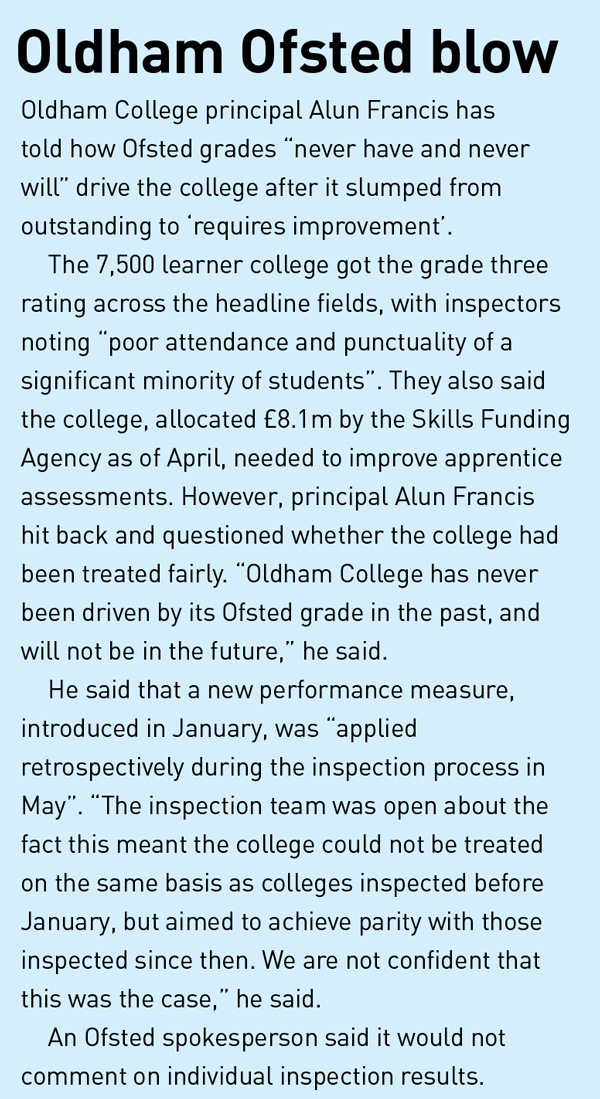Skills Minister Nick Boles has justified the government’s emphasis on apprenticeships at the cost of adult education by pointing to research showing the programme had a 43 per cent greater return on public investment.
Speaking on day one of the Association of Employment and Learning Providers annual conference [click here for the FE Week supplement] in his first public FE event since the General Election, Mr Boles pointed to data published earlier in the day suggesting apprenticeships delivered a higher return to the economy than other vocational education courses.
The report, entitled Measuring the Net Present Value of Further Education in England, showed there was a £28 return for every £1 invested in level three apprenticeships, but for non-apprenticeship courses at level three the return was 43 per cent lower at £16.
“Apprenticeships at level three, we estimate, generate £28 of value to society for every £1 that government spends,” he said at Hammersmith Novotel on Monday.
“Apprenticeships at level two generate £26 for every pound of government investment. A full time level two non-apprenticeship course, generates £21 for every £1 of investment.”
The level three full time non-apprenticeship course generated even less than level two with £16 per £1 put in. And Mr Boles said the research “was not very different” to that of last year.
“It suggested that there was a dramatic impact on people’s earning power if they completed at level two or level three apprenticeship, a slightly less but nevertheless positive impact if they did a full-time programme,” he said. He said the research would “guide” the government.
“We’re going to be guided very clearly by this data,” said Mr Boles. “We didn’t just pull the figure of 3m apprenticeships out of the air for no reason, we did so because all of the evidence suggests that a programme which combines employment with training where they both feed off each other, both with formal training and informal training in work, that those are the programmes that have the highest impact on individuals’ chances of increasing and improving their income and on the national wellbeing, and it is because of that that we shall be investing in it as an apprenticeship programme.”
He added: “I don’t want to pretend to you that there are not going to be areas where we have to cut back. You know as well as I do that the whole area of post+16 education and 19+ skills is an area that is not protected within the budget.
“And at the same time it doesn’t take a genius the work out that we are going to have to invest more in apprenticeships if we are going to both achieve the 3m number and ensure that the quality which is being shored up by the trailblazer reforms is always assured.”
He continued: “That is going to cost more money for employers and for government if we’re going to hit hat 3m number of high quality apprenticeships.”
In his speech ahead of the July 7 Budget, he further told delegates: “I want to talk to you about the context in which decisions will be made and I want to be very frank with you — there’s a budget next week and a spending review in the autumn and we are working extremely hard in government to work out what are the priorities we should be investing in.
“So there will over the next few months be some difficult choices to make about the less productive elements of our FE system, about those programmes where maybe we can expect more from the individuals taking the programme in terms of their ability to contribute to the funding of them and we also need to look at the range of qualifications available to young people.”
Mr Boles also reaffirmed the government’s commitment to look at the general FE college model, as outlined in the Conservative manifesto.
“We need to look at the range of institutions that exist within FE and technical and professional education and ask ourselves whether the general FE colleges we have had for so long, many of which do a very fine job in lots of areas, whether that general FE model is one we want for the future when resources are strained,” he said.
He concluded: “We need to be helping people make investments in their own future.
“We as a government need to be investing in the future of young people so that they can command higher wages and go on to pay higher taxes and we need to help companies make the investment in the future of their workforce so that they whole economy and the whole sector in which they operate proves that they are more competitive.
“It is by improving the competitive element of companies, by improving the productivity of individuals that we will give everybody the chance to succeed in their chosen career.”
The full AELP 2015 annual conference speech of Skills Minister Nick Boles
AELP 2015 annual conference host Laura Kuenssberg:
There are plenty of things Skills Minister Nick Boles has to address — the prioritisation of apprenticeships, and the thing that we keep coming back to already today, that three million headline figure. The point is, if you achieve it just in number, then maybe it’s not really worth it. If you achieve it in quality too, then maybe it is something that’s really worth talking about. So how is he going to deliver that? So, Nick Boles, without further ado.
Mr Boles:
Laura, thank you very much. I’m not sure if I have thanked you for drawing my attention to what is always excellent journalism in FE Week, but otherwise, thank you for the introduction.
And thank you everyone for asking me today, this is my first public event since the election, and I have delayed making any public statements until now for a reason, and it’s that very same set of reasons which are I’m afraid going to be why I am going to talk about it freely and openly, but I won’t be taking questions afterwards.
I’m delighted the Prime Minister appointed me again to take this position at the election, because I felt like I spent the previous 10 months before the election doing my own little apprenticeship about the FE sector and about apprenticeships themselves.
And it’s an extremely complex field which to outsiders can prove pretty baffling, but certainly by May I felt I had a pretty good understanding of the different elements of it, the different institutions, and the different people, and of what is good and what is not so good in our system of technical and professional education.
I spent most of the last 10 months, as you probably would have observed, embarrassing poor apprentices up and down the land by forcing them to take selfies with me, and I feel that the least I can do now is to get back into the trenches to try and make sure that the programme that they are on of apprenticeships is a programme that commands widespread respect throughout the country as a high quality way to a carer as it once did perhaps more recently have not been able to do.
Now, I want to talk to you about the context within which decisions will be made, and I’ll just be very frank with you; there is an upcoming budget, it will not have escaped your attention, and there is a spending review in the autumn, and we are working extremely hard in government to work out what are the priorities that we should be investing in, and what are other areas where efficiencies and savings will need to be made.
And if I am, I’m afraid, being a little bit coy about not taking questions, it’s simply because I don’t want to just irritate you by saying: ‘Wait for the next budget,’ or, ‘Wait for the spending review.’
I promise you I will tell you, in the next few minutes, everything I can tell you at this stage about the direction of our thinking.
And it all starts with this much-used buzzword, which lots of people use but perhaps not everybody understands, which is productivity.
The Chancellor has already announced that there will be a productivity plan that will be produced alongside the budget, and which I can tell you right now is informing all of our conversations, both about the budget and about the spending review, and about associated reforms.
What are the steps, what are the programmes that are most going to assist the process of increasing the productivity of British worker?
And actually, what is productivity? It’s simply this — you go to work, you work for an hour, what is going to ensure that the value of what you produce in that hour is higher this year than it was last year, and is comparable to our competitors?
And we start off, famously, in a position where our productivity is not as high as our competitors’, and I think we need to be honest that there are both good and bad reasons for that. In this country, we have an astonishingly high, now record high, employment rate.
What that means is that many of the least productive people in our society are in full-time employment, and to my mind that’s good news — but of course, its effect on the figures is to tug down the average productivity of the labour force per hour of work.
You go across the channel, you can go into a country where many of the less productive members of society are not in employment; they have much lower employment rates, and much higher average productivity rates. Personally, I know which country I prefer to be living and working in.
But what that does not do is somehow excuse us from any attempt to ensure that productivity is increasing every year, because it’s only through increases in productivity every single year that we can ensure that working people will secure, because they’ve earned a wage increase in real terms every single year. That is our challenge.
I don’t think we should be so obsessed about the rather glib stories about, you know, we have to work until Friday and the French will knock off on Thursday morning, because actually our employment rates are so much higher.
What we should be focused on is what is going to help everybody increase their productivity every year so that they can command higher wages from employers, who are able to compete in the market place because of the abilities of the people they employ.
So it will be the productivity plan that will drive all of the reforms in the areas for which I am responsible. And you may not have noticed, because you have all been travelling to get here today, but we have released this morning some dramatic figures which show how important it is what you do in terms of its effect on national income and productivity.
We have released the figures of estimates of the value, per pound of government investment, of different kinds of technical and professional education programmes.
Apprenticeships at level three generate, we estimate, £28 of value to society for every £1 that government spends. Apprenticeships at level two generate £26 for every £1 of government investment. A full-time level two course generates £21 for every £1 investment — and slightly curious, this, I’m interested to see all of the data issues that can sometimes have underlying things going on, which we need to understand better — full-time level three generates £16 per £1 investment, which implies that level three full-time at college is generating less than a level two, where an apprenticeship at level three is generating more than a level two.
It’s not impossible — of course it’s not impossible — but I think we need to understand the figures.
Now, what that does is sit very comfortably alongside the data that we released last year, which talked about the impact on people’s earning power of different programmes, and it was not very different.
It suggested that there was a dramatic impact on people’s earning power if they completed a level two or level three apprenticeship; a slightly less, but nevertheless positive, impact if they did a full-time programme.
We are going to be guided very clearly by this data. We didn’t just pick out the figure of 3m apprenticeships out of the air for no reason, we did so because all of the evidence suggests that a programme that combines employment with training, whereby both feed off each other, both formal training and informal training in work, that those are the programmes that have the highest impact on individuals’ chances of increasing and improving their income, and on the national wellbeing — and it is because of that that we will be investing in that apprenticeship programme.
We need, however, to have a good career programme, and we all accept what I think of as wholly mistaken and deluded for the Labour Party to suggest, that we should get rid of level two apprenticeships and somehow rebadge them as some other programme — that was a misguided policy.
Where I think it is right is to say we need something that is there for people who are not yet ready to go onto a level two apprenticeship, and I think that many of you have been doing excellent, innovative work in developing the concept of traineeships, and while we started quite small with traineeships in order to get it right, it is now something that we very much want to expand in the future.
And I think we may need to look at the whole definition of what is in a traineeship, and here we need your help and your ideas.
I think it is incredibly important that the programmes the Job Centre Plus has to try and help people gain the skills and the experience and the confidence they need to be able to secure jobs, integrates well with the traineeship programme that somebody might get on to when they arrive at their college without going through JCP, but where people recognise that they need preparation before they can hold down an apprenticeship and complete it successfully.
So there will be an absolute commitment to that pre-apprenticeship stage, there will be a commitment to traineeships, but I hope that we can all think quite creatively about what should go into a traineeship, and whether the terms within which it is currently defined are the best.
I am absolutely certain it needs to involve English and maths; I’m absolutely certain it needs to involve work experience.
What we need to have a debate about is does it need to have anything else in there specifically, do we need to be more prescriptive, and are we right in terms of the length of time that it is expected to last, currently a maximum of six months, and are we right to restrict the provision of it to certain kinds of providers more restrictively than we do with apprenticeships — these are all questions that I am very keen to explore with you over the next few months.
I don’t want to pretend to you, however, that there are not going to be areas where we are going to have to cut back. You know as well as I do that the whole area of post-16 education and of 19+ skills is an area that is unprotected within the budget; it does not have a ring-fence on it like education in early years or like the NHS or some other areas of government spending and we are of course going to have to look for some savings in the overall budget, and at the same time it doesn’t take a genius to work out that we are going to have to invest more in apprenticeships if we are going to be able to both achieve the 3m number, and ensure that the quality, which is being shored up by the Trailblazer reforms, that that quality is always assured, it is a minimum of 12 months, it is providing real value added to a person undertaking the apprenticeship.
That is going to cost more money for employers, cost more money for government, if we are going to hit that 3m number of high quality apprenticeships.
So there will, over the next few months, be some difficult choices to take about the less productive bits of our FE system, about those programmes where maybe we can expect more from the individuals taking the programme in terms of their ability to contribute to the funding of them.
And we also need to look, I believe, at the range of qualifications that are offered to young people. Are they properly defined? We need to look at the range of institutions that exist within FE, technical and professional education, and ask ourselves whether the general FE college that we have had for so long — many of which do a very fine job in lots of areas — whether that general model is a model that we want for the future when resources are constrained.
I am not going to pretend to you that I have final answers to any of those questions, it would be a bit cheeky if I did at this early stage — but those are the questions that we are asking intensively in government and it will always be interesting to hear from you in you have any particular views on that.
The final point though, I do want to make is the connection between this and the rest of the government’s programme.
The Prime Minister today has been setting out in a speech what is the whole point of the reforms to welfare and the reforms to education, and the reforms to businesses in this country, and it’s very, very clear, which is that we want people to be better off because their own efforts command a higher wage from businesses who are competing and succeeding.
That is the only sustainable way for people to be able to improve their lot in life.
We want welfare benefits to be there to help people who can work make the transition into work, but never to be put in a position where actually they would be better off staying on benefits than taking those few extra hours of employment.
And we want the welfare system to be there above all for those whose working days are over, who have worked hard all their lives, and have the right to earn a decent pension that increases every year, and for those who are never going to be able to participate fully in the workforce because their own abilities are so limited, or their own health is so challenged, that it would be unreasonable or unfair to expect it.
We have made quite dramatic strides in that direction over the last five years, but we have had by no means arrived at the final conclusion of that policy.
There is more reform to be done within the welfare system, within the education system, to ensure that that balance of responsibility and support is there for everyone and expects the right amount of contribution from everyone.
Within the area for which I am responsible, therefore, some of the same messages apply. We need to be helping people make investments in their own future.
We as a government need to be investing in the future of young people so that they can command higher wages and go on to pay higher taxes, and we need to help companies make the investment in the future of their workforce so that the whole economy and the whole sector in which they operate become more competitive.
It is by improving the competitiveness of companies, improving the productivity of individuals, that we will deliver an education system that gives everybody the chance to succeed in their chosen career.
That is what we’re working on, you will discover a little bit more next week in the productivity plan and in the budget, and I hope that some of you will be involved in conversations with me through various round tables that I will be holding over the summer which we will then begin to map out the detail of the reforms that will deliver this set of goals. Thank you very much indeed.







